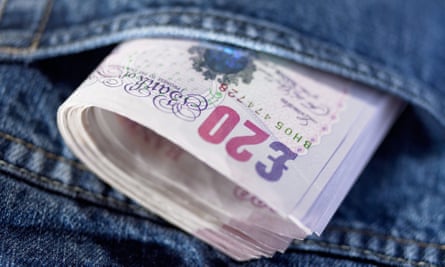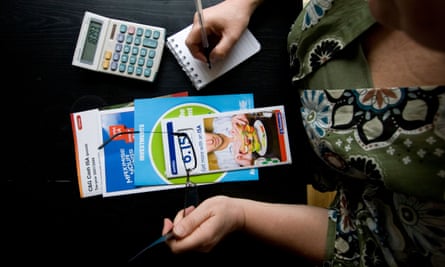Lockdown savings? Put them in an Isa while you can
Isas have fallen out of favour with some consumers but with tax increases potentially on the way to cover the bill for the coronavirus pandemic, experts are urging those with money to save or invest to take advantage of the allowances available to them.
Many Britons have seen their incomes remain much the same but their spending plummet as a result of being stuck at home, and huge sums of cash have built up in bank and building society accounts. Figures from the Bank of England show that households had accumulated £125bn in excess savings by November 2020. And this week the Bank’s policymaker Gertjan Vlieghe said: “Significant further savings are likely to have been accumulated since then, possibly doubling or tripling the accumulated amount by the middle of this year.”
Sarah Coles at the investment firm Hargreaves Lansdown says the government “will be considering any possible way to fill the coffers”. She adds that any changes to Isas in the near future “aren’t going to make them more beneficial for savers and investors”. Therefore, those fortunate enough to have money to put away should make use of the existing rules while they can.
The basics
Isas let you protect the returns on your savings from tax. There are several types, although the two main ones are the cash Isa and the stocks and shares Isa. You pay no income tax on the interest or dividends you receive within an Isa, and any profits from investments are free of capital gains tax.
During the current tax year you can save up to £20,000 in one type or across two or more. You have until midnight on 5 April each year to add money to your Isa(s), and the allowance each year does not carry over.
Are they worth having?
 View image in fullscreenBank of England figures showed that households had accumulated £125bn in excess savings by November 2020. Photograph: Alamy
View image in fullscreenBank of England figures showed that households had accumulated £125bn in excess savings by November 2020. Photograph: Alamy
Some people argue that the introduction of the personal savings allowance five years ago means there is not much point in having a cash Isa. This allowance means basic-rate taxpayers can receive £1,000 of interest each year without paying any tax, while higher-rate taxpayers can receive up to £500.
But Laith Khalaf at the investment firm AJ Bell says a cash Isa does offer some future-proofing against interest rate rises and changes to the tax system – in particular, if the personal savings allowance was to be reduced or scrapped.
“It’s now also possible to switch between a cash Isa and stocks and shares Isa without using up any fresh allowance, so the tax wrapper could still be valuable for those looking to invest the money further down the line,” he adds.
Cash Isas
Figures from the data provider Moneyfacts show that average interest rates on cash Isas reached new lows this month. A typical easy access cash Isa is paying only 0.24%, down from 0.83% a year ago.
At the time of writing, the best instant access cash Isa rate was 0.6% from Al Rayan Bank. This account has a minimum opening balance of £50.
To get more than 1%, you have to tie up your cash for several years. For example, Gatehouse Bank has a five-year fixed-term account paying 1.3% where the minimum deposit is £1,000. (Both of the above are expected, rather than fixed, rates).
Investment Isas
Stocks and shares Isas offer the potential for much better returns than cash but you need to be comfortable with the risk – investments can go down in value as well as up, meaning you could lose money.
Don’t just opt for whatever your bank is offering
You can buy individual shares and put them in an Isa but most investors should opt for a fund – typically a unit trust or investment trust – that pools people’s money and uses it to buy a portfolio of shares (or other assets). There are thousands of funds available and which you choose will depend on what you want – and don’t want – your money to go into, plus how much risk you are prepared to accept.
Don’t just opt for whatever your bank is offering. Those who do not feel confident about investing may want to look at all-in-one funds that spread your money between different stock markets and asset classes.
The asset manager Vanguard offers low-cost, ready-made portfolio funds called LifeStrategy funds that are very popular at the moment, particularly its 80% Equity version, which is 80% shares, 20% bonds. If you buy direct, you can get one going with a £500 lump sum or by agreeing to pay in at least £100 a month by direct debit.
Alternatively, first-timers could go for a cheap tracker fund that mimics the performance of a broad global index such as the MSCI World. For example, Fidelity has the Index World Fund (the minimum investment is £25).
Fundsmith Equity was the number one bestselling fund on the investment platform Interactive Investor last month and has been an entry-point fund for many isavers. Run by Terry Smith, it has about £23bn under management and, in terms of performance, was up 53% over three years and 129% over five years as of Wednesday. However, its performance over the last few months has not been brilliant. If you buy direct, the minimum opening investment is a £1,000 lump sum or £100 a month.
For those looking for an ethical fund, AJ Bell says one of the most popular at the moment is Baillie Gifford’s Positive Change Fund, which invests mainly in companies doing good work in education, social inclusion, healthcare and the environment. Its top holding is the electric car company Tesla.
 View image in fullscreenIt’s important to pick the right type of Isa for your needs. Photograph: Alamy
View image in fullscreenIt’s important to pick the right type of Isa for your needs. Photograph: Alamy
You can buy direct from some fund management companies but for many funds you have to invest via a website, usually called a platform. Big ones include Hargreaves Lansdown, Fidelity Personal Investing and AJ Bell Youinvest. You typically pay one fee to the fund manager, plus another to the platform.
Whichever fund you choose, setting up a monthly savings plan reduces some of the risk involved – it is safer than putting in larger lump sums because you avoid the danger that the market will crash right after you part with your money. Also, you benefit from pound cost averaging: when stock markets fall, your monthly payment buys more fund units at the lower price. Some platforms let you invest as little as £25 a month.
It’s not all about cash and stocks and shares Isas. There’s also the …
 View image in fullscreenIsas could give you a lift towards retirement. Illustration: Ryan Gillett
View image in fullscreenIsas could give you a lift towards retirement. Illustration: Ryan Gillett
Lifetime Isas
These let you save for either a first home or retirement, and offer a great deal: you can put away up to £4,000 each year until you are 50 and the government will add a 25% bonus to your savings, up to a maximum of £1,000 a year. To open one you must be aged 18 to 39.
The money invested can be withdrawn at age 60-plus, or earlier if it is being used to buy a first home worth up to £450,000 in the UK. You can hold cash or stocks and shares in your lifetime Isa, or a combination of both. The annual £4,000 cap counts towards your £20,000 Isa limit. You can get hold of your money if you are terminally ill but otherwise must pay a penalty – currently 20%, rising to 25% from 6 April 2021 – if you withdraw money for any reason other than the above.
The financial app Moneybox offers a cash lifetime Isa paying a table-topping 0.85% (although that rate includes a fixed one-year interest bonus of 0.35%), while Nottingham building society has one paying 0.8%.
Junior Isas
These are a long-term, tax-free account into which you can put up to £9,000 each tax year on behalf of a child under 18 living in the UK. The aim is to build up a pot to help with things such as university costs or a home deposit. There are two types – cash-based, and stocks and shares – and your child can have either or both. The savings can’t be withdrawn until the child reaches 18, at which point they are legally entitled to do what they like with the cash.
 View image in fullscreenYou can set up a Junior Isa on behalf of a child under 18. Photograph: Alamy
View image in fullscreenYou can set up a Junior Isa on behalf of a child under 18. Photograph: Alamy
With up to 18 years to play with, some parents will want to go down the stock market route. However, the interest rates on cash Junior Isas aren’t bad: Coventry building society’s pays 2.95%, while the Bath and Darlington building societies are paying 2.5%.
Innovative finance Isas
These are tax-free accounts for peer-to-peer lending and debt-based crowdfunding. They allow investors to earn tax-free interest on peer-to-peer loans, and on money they lend to things such as renewable energy projects, when these are held within the Isa “wrapper”.
But tread carefully: in 2019 the Financial Conduct Authority said investments held within innovative finance Isas “are generally high-risk”.
The Isa millionaires
Charles is one of those who has made a fortune from Isa investments, with his portfolio worth more than £1m. “I didn’t set out to become an Isa millionaire – I just wanted to take as much advantage of my tax-free allowance as possible,” he says.
I normally invest through unit trusts or investment trusts because I wouldn’t know a biotech company from a boiled eggCharles
He invested in Peps, the predecessor of Isas, until the switch in 1999. “I have always tried to invest the full allowance in most years,” he says.
Charles, who is retired, says he takes a long-term view. “In the early days of the pandemic, my Isas were down around 30% but I didn’t panic. I revisited my portfolio and saw there were some opportunities I could take advantage of but I didn’t sell up, and they have bounced back.”
He adds: “I know there’s a long-term trend of phenomenal advances in medication, so I have invested in scientific advancement and healthcare as well as industries that benefit from technological innovation. I normally invest through unit trusts or investment trusts because I wouldn’t know a biotech company from a boiled egg.”
Charles is one of Hargreaves Lansdown’s 579 Isa millionaires. Their average age is 71, and two-thirds are men.



